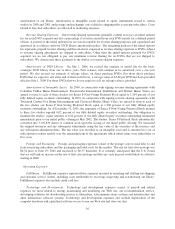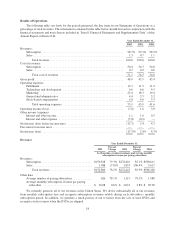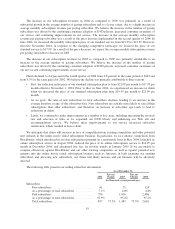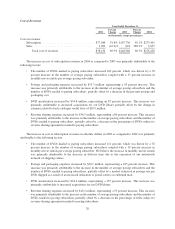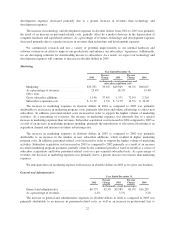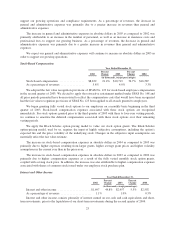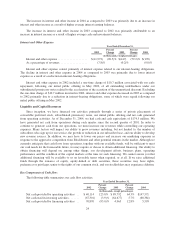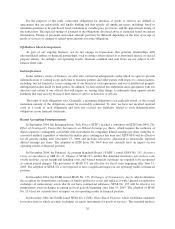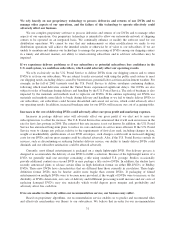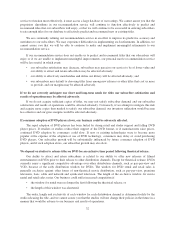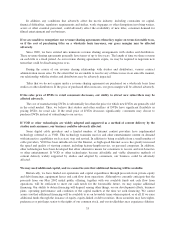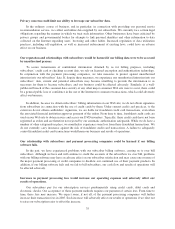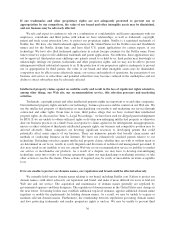NetFlix 2004 Annual Report Download - page 42
Download and view the complete annual report
Please find page 42 of the 2004 NetFlix annual report below. You can navigate through the pages in the report by either clicking on the pages listed below, or by using the keyword search tool below to find specific information within the annual report.For the purposes of this table, contractual obligations for purchase of goods or services are defined as
agreements that are enforceable and legally binding and that specify all significant terms, including: fixed or
minimum quantities to be purchased; fixed, minimum or variable price provisions; and the approximate timing of
the transaction. The expected timing of payment of the obligations discussed above is estimated based on current
information. Timing of payments and actual amounts paid may be different depending on the time of receipt of
goods or services or changes to agreed-upon amounts for some obligations.
Off-Balance Sheet Arrangements
As part of our ongoing business, we do not engage in transactions that generate relationships with
unconsolidated entities or financial partnerships, such as entities often referred to as structured finance or special
purpose entities. Accordingly, our operating results, financial condition and cash flows are not subject to off-
balance sheet risks.
Indemnifications
In the ordinary course of business, we enter into contractual arrangements under which we agree to provide
indemnification of varying scope and terms to business partners and other parties with respect to certain matters,
including, but not limited to, losses arising out of our breach of such agreements and out of intellectual property
infringement claims made by third parties. In addition, we have entered into indemnification agreements with our
directors and certain of our officers that will require us, among other things, to indemnify them against certain
liabilities that may arise by reason of their status or service as directors or officers.
The terms of such obligations vary. Generally, a maximum obligation is not explicitly stated, so the overall
maximum amount of the obligations cannot be reasonably estimated. To date, we have not incurred material
costs as a result of such obligations and have not accrued any liabilities related to such indemnification
obligations in our financial statements.
Recent Accounting Pronouncements
In September 2004, the Emerging Issues Task Force (“EITF”) reached a consensus on EITF Issue 04-8, The
Effect of Contingently Convertible Instruments on Diluted Earnings per Share, which requires the inclusion of
shares related to contingently convertible debt instruments for computing diluted earnings per share using the if-
converted method, regardless of whether the market price contingency has been met. EITF 04-8 will be effective
for all periods ending after December 15, 2004 and includes retroactive adjustment to historically reported
diluted earnings per share. The adoption of EITF Issue No. 04-8 does not currently have an impact on our
operating results or financial position.
In November 2004, the Financial Accounting Standards Board (“FASB”) issued SFAS No. 151, Inventory
Costs, an amendment of ARB No. 43, Chapter 4. SFAS 151 clarifies that abnormal inventory costs such as costs
of idle facilities, excess freight and handling costs, and wasted materials (spoilage) are required to be recognized
as current period charges. The provisions of SFAS 151 are effective for fiscal years beginning after June 15,
2005. The adoption of SFAS 151 is not expected to have a significant impact on our operating results or financial
position.
In December 2004, the FASB issued SFAS No. 153, Exchanges of Nonmonetary Assets, which eliminates
the exception for nonmonetary exchanges of similar productive assets and replaces it with a general exception for
exchanges of nonmonetary assets that do not have commercial substance. SFAS No. 153 will be effective for
nonmonetary asset exchanges occurring in fiscal periods beginning after June 15, 2005. The adoption of SFAS
No. 153 does not currently have an impact on our operating results or financial position.
In December 2004, the FASB issued SFAS No. 123(R), Share-Based Payment, which establishes standards
for transactions in which an entity exchanges its equity instruments for goods or services. This standard replaces
26


